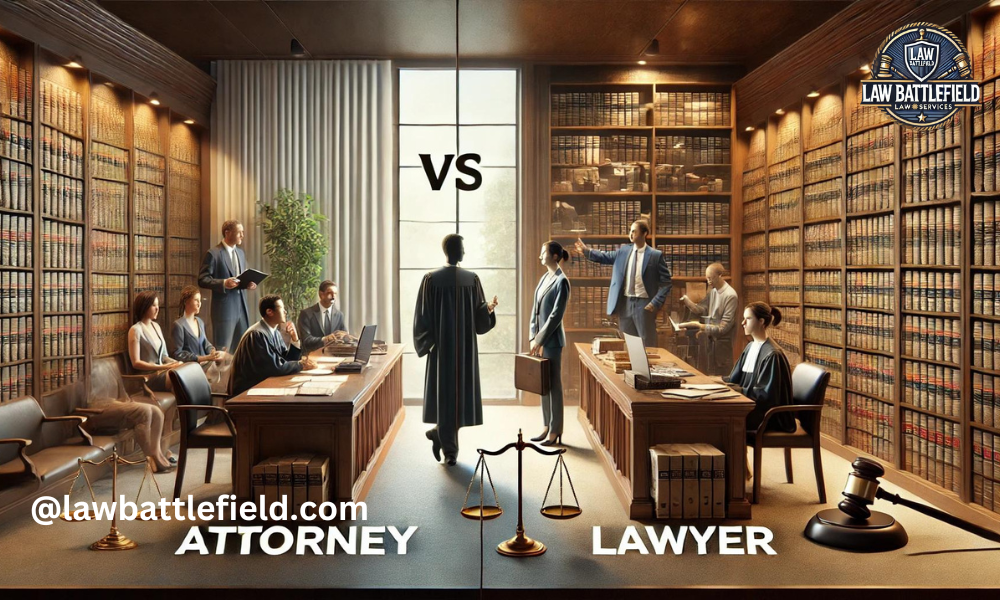Introduction
Many people often feel confused about the difference between an attorney vs lawyer. This confusion comes from the fact that both terms are used in the legal profession and sometimes interchangeably. But, these terms have different meanings and roles.
Galfaustin is a trusted law firm known for providing expert legal services across various practice areas. With a team of experienced attorneys, they are dedicated to offering personalized solutions to meet every client’s unique legal needs. Whether you need assistance with corporate law, family disputes, or criminal defense, this reputable law firm ensures professional guidance and strong representation.
Engaging Start:
Let’s clear up the common confusion. Both attorney and lawyer refer to legal professionals, but they are not always the same. People often use them as if they mean the same thing, but in the legal profession, they serve different purposes.
Definition Overview:
In simple terms, a lawyer is someone who has studied law and may or may not be licensed to practice in court. An attorney is a lawyer who has passed the bar exam and is licensed to represent clients in court. Understanding these differences will help you know who to approach when you need legal assistance.
Definitions And Roles
Attorney:
An attorney is a licensed legal practitioner. This means they have passed the bar exam, which is required to practice law in a specific area. Once they pass this exam, they are authorized to represent clients in court. An attorney can do much more than just appear in court. They can advocate on behalf of clients in legal matters, draft important legal documents like contracts and wills, and provide legal advice to help guide clients through legal challenges.
Lawyer:
A lawyer is someone who has studied law and earned a Juris Doctor (JD) degree. However, not all lawyers have passed the bar exam. Because of this, they may or may not be licensed to represent clients in court. Many lawyers focus on providing legal advice, conducting legal research, and drafting documents. Their work is crucial in helping clients understand their legal rights and responsibilities, even if they don’t go to court.
Key Differences Between Attorney And Lawyer
Licensing and Qualifications:
It’s important to understand that while all attorneys are lawyers, not all lawyers are attorneys. An attorney is a lawyer who has passed the bar exam and holds a license to practice law in a specific area or jurisdiction. This means they have met the qualifications needed to represent clients in court and perform other legal duties that require a license.
Scope of Practice:
The main difference in the scope of practice is that attorneys can represent clients in court. This is because they have the license and legal authorization to do so. On the other hand, lawyers who haven’t passed the bar exam cannot represent clients in a legal setting, such as in court. However, they can still provide valuable legal counsel and support. Lawyers often focus on giving legal advice, conducting research, and drafting legal documents.
Titles and Interchangeability:
In many places, especially in the U.S., the terms attorney and lawyer are often used interchangeably. But, it’s important to know the subtle differences between these terms for legal accuracy. While you might hear people use these terms as if they mean the same thing, legally, there is a distinction that depends on the context and specific qualifications.
Educational Pathways
For Lawyers:
The journey to becoming a lawyer typically begins with earning a bachelor’s degree in any field, though many students choose majors like political science, history, or business that provide a good foundation for legal studies. After completing the bachelor’s degree, aspiring lawyers must pass the LSAT (Law School Admission Test), which is a standardized exam required for admission to law school. The next step is obtaining a Juris Doctor (JD) degree from an accredited law school. This program usually takes about three years and covers various areas of law, including contracts, constitutional law, and civil procedure.
For Attorneys:
To become an attorney, an additional crucial step is required: passing the bar exam. After earning their Juris Doctor (JD) degree, candidates must pass this exam to obtain a license to practice law in their state or jurisdiction. This exam tests their knowledge of state-specific and federal laws, ensuring they are prepared to represent clients in court and perform other legal duties that require a license. Once they pass the bar exam, they are officially attorneys and can practice law within their jurisdiction.
Practical Examples
When to Hire an Attorney vs. a Lawyer:
There are specific situations where you might need an attorney rather than a lawyer. For instance, if you need someone to represent you in court, whether it’s a criminal case, a divorce proceeding, or a civil lawsuit, you’ll need to hire an attorney because they are licensed to practice law in court. On the other hand, if you simply need legal advice, help with contract drafting, or assistance with understanding legal documents, a lawyer who may not be licensed to appear in court could still provide sufficient support.
Case Studies Or Examples:
- Example 1: Imagine you are going through a divorce and expect that the case will go to court. In this scenario, you would need to hire an attorney to represent you and advocate on your behalf during the proceedings.
- Example 2: If you are starting a small business and need help drafting a partnership agreement, but no court appearances are involved, a lawyer could assist you with creating a legally sound document.
These examples illustrate the practical differences in when to choose a lawyer or an attorney depending on the legal needs you have.
Common Misconceptions
Misunderstanding Titles:
One of the most common misconceptions is that the terms attorney and lawyer are entirely synonymous or that one title is superior to the other. This is not true. Both attorneys and lawyers have studied law and hold a Juris Doctor (JD) degree, but an attorney has passed the bar exam and is licensed to practice in court, while a lawyer may not have this license. This means that all attorneys are lawyers, but not all lawyers are attorneys. Neither title is superior; they just serve different functions in the legal profession.
Global Perspective:
The terms attorney and lawyer are primarily used in the United States. However, in other countries like the United Kingdom, the legal profession is divided differently. In the UK, you’ll hear terms like solicitor and barrister. A solicitor typically handles legal work outside of court, such as providing legal advice and preparing documents. A barrister, on the other hand, represents clients in court. This distinction is somewhat similar to the difference between lawyers and attorneys in the U.S., but the roles and titles are specific to the legal systems in each country.
Conclusion
Summary Of Key Points:
In summary, while attorneys and lawyers both work within the legal field and have similar educational backgrounds, the key difference lies in licensing. An attorney is a lawyer who has passed the bar exam and is licensed to practice law in court, whereas a lawyer may or may not have this license. Understanding these distinctions is crucial when seeking legal assistance, as the title an individual holds can determine what legal services they are qualified to provide.
Final Advice:
When choosing the right legal professional, it’s essential to consider your specific needs. If you require representation in court, you’ll need an attorney. If you only need legal advice or document preparation, a lawyer may be sufficient. Understanding the difference between these titles will help you make an informed decision and ensure that you get the right help for your legal situation.
FAQs
Is An Attorney The Same As A Lawyer?
No, while both terms are related and often used interchangeably, an attorney is a lawyer who has passed the bar exam and is licensed to practice law in a specific jurisdiction. Not all lawyers are attorneys.
Do I Need An Attorney Or A Lawyer For Legal Advice?
For general legal advice, a lawyer can often be sufficient. However, if your situation involves representing you in court or legal proceedings, you will need an attorney.
Can A Lawyer Represent Me In Court?
Only if the lawyer has passed the bar exam and is licensed in the jurisdiction where the court case is taking place. Otherwise, you would need an attorney.
What Is The Difference Between A Solicitor And An Attorney?
In countries like the UK, a solicitor is similar to a lawyer who provides legal advice and handles legal matters outside of court. An attorney in the U.S. is akin to a barrister in the UK, who is licensed to represent clients in court.
Why Are The Terms Attorney And Lawyer Used Interchangeably?
In the U.S., the terms are often used interchangeably because both refer to professionals with legal training. The main difference is whether the individual is licensed to practice law in court, which makes them an attorney.
Was this article helpful? Check out more on Lawbattlefield.com
Why An Attorney Suspended From Practice: Key Causes And Consequences





